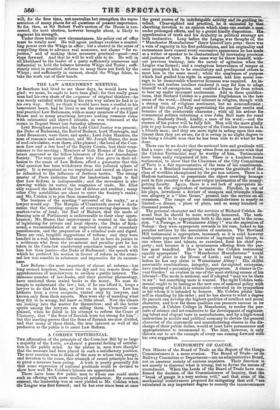THE LAW AMENDMENT MEETING.
IF Bentham had lived to see these days, he would have been glad: we mean, he ought to have been glad ; for that really great man had his own share of the exigeance of original thinkers—he was rarely satisfied with having his own way unless he had it in his own way. Still, we think it would have been a cordial to his benevolent heart, had he lived to see the meeting of a society of real practical Law Reformers, with so many members of the Upper House and so many practising lawyers making common cause with substantial and shrewd citizens, as was witnessed at the rooms in Regent Street last Saturday afternoon. Lord Brougham presided ; the Lord Chief Justice was present; the Duke of Richmond, the Earlof Radnor, Lord Monteagle, and Lord Beaumont, were there, and spoke ; Lord John Manners, the man of romance and sentiment, and Mr. Joseph Hume, the man of cool calculation, were there, alike pleased ; the head of the Com- mon Law and a late head of the Equity Courts, lent their coun- tenance to the meeting ; Members of both Houses of the Legis- lature appeared as the fellow labourers of the Law Amendment Society. The very names of those who thus gave in their ad- hesion to the cause of Law Reform afford a guarantee that this vital question has been withdrawn from the polluted sphere of party. It is recognized as too important and sacred an object to be submitted to the influence of factious tactics. The strong muster of Peers indicates that the landowners begin to feel that Law Reform is indispensable ; and the movement is also drawing within its vortex the magnates of trade. Mr. Eliot ably exposed the defects of the law of debtor and creditor ; many other City notabilities are about to enter the Society's ranks ; and Mr. Cobden is to join them immediately.
The business of the meeting " savoured of the realty," as a lawyer would say. The Marquis of Clanricarde moved a decla- ration that the existing system of conveyancing depresses the market-value of land ; the Earl of Radnor, that the mode of framing acts of Parliament is unfavourable to their clear appre- hension; Mr. Hume, that improvement is wanted in the mode of legislating for private and local objects ; the Duke of Rich- mond, a recommendation of an improved system of secondary puniehments, and the preparation of a criminal code and digest. These are real, tangible suggestions of reform ; and they were handled in a real, business-like manner. Let us here do justice to a nobleman who from the prominent and peculiar part he has taken in the Corn-law controversy sometimes tempts one to do him less than justice—the Duke of Richmond : the speech with which he prefaced his motion in favour of reform in the crimi- nal law was sensible in substance and impressive for its earnest-
MISS.
Law Reform—the most important of almost all reforms—has long seemed hopeless, because too dry and too remote from the apprehensions of non-lawyers to awaken a public interest. The immense number of law-books, and their peculiar phraseology, have rendered them sealed books to the many. No man at- tempts to understand the law ; but, if he can afford it, keeps a lawyer to do that for him, or lives on in ignorance. Law has hitherto been a terra incognita, visited only by lawyers, and known only from their reports. Men were shy of mending what they felt to be wrong, but knew so little about. Now the clients are looking into the matter for themselves; and all the better spirits among the lawyers are aiding them. Cromwell com- plained, when he failed in his attempt to reform the Court of Chancery, that ‘" the Sons of Zeruiah. were too strong for him" : but this meeting proves that the Sons of Zeruiah are now divided, and that many of them think, the true interest as well of the profession as the public is to assist Law Reform.


























 Previous page
Previous page